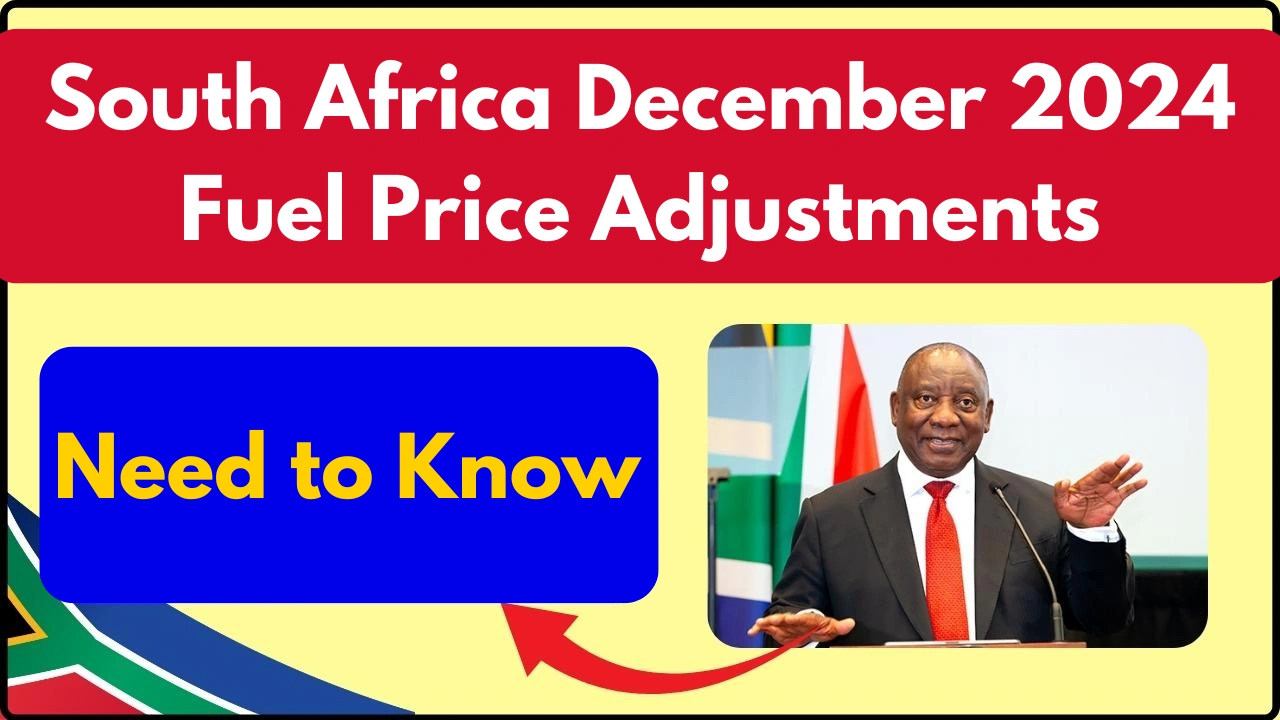In South Africa, fuel price fluctuations are a constant concern for motorists, and the December 2024 adjustments bring a mix of good and bad news. Petrol prices are rising modestly, while diesel prices are seeing a sharper increase. These changes will affect not only your personal budget but also transportation costs, goods pricing, and household energy bills. This article breaks down the key factors behind the changes and offers practical advice on how to manage these increases, including exploring renewable energy solutions.
Key Fuel Price Changes in December 2024
The fuel price changes in South Africa for December 2024 are as follows:
- Petrol Prices: A 17-cent increase per litre for both 93 and 95 Unleaded Petrol.
- Diesel Prices: A more substantial increase of 55 to 56 cents per litre for diesel (500ppm and 50ppm types, respectively).
Key Factors Contributing to Price Increases:
- Global Oil Prices: While oil prices have remained relatively stable, small shifts in the price of Brent Crude Oil (currently at $72.70 per barrel) still impact local fuel costs.
- Weakened Rand: The South African Rand has depreciated against the US Dollar, driving up the cost of importing crude oil and refined fuel products.
- Seasonal Demand for Diesel: Increased global demand for diesel during the Northern Hemisphere’s winter months, especially for heating, contributes to the rise in diesel prices.
- Rising Shipping and Logistics Costs: Global disruptions and higher shipping costs are affecting the overall price of transporting fuel to South Africa.
Current Fuel Prices
As of December 2024, the new fuel prices are:
- Petrol:
- 93 Unleaded Petrol: Increased by 17 cents per litre.
- 95 Unleaded Petrol: Increased by 17 cents per litre.
- Current Prices:
- Inland: R21.47 per litre (95 ULP), R21.15 per litre (93 ULP).
- Coastal: R20.68 per litre (95 ULP).
- Diesel:
- 50ppm Diesel: Increased by 56 cents per litre.
- 500ppm Diesel: Increased by 55 cents per litre.
- Current Prices:
- Inland: R19.33 per litre.
- Coastal: R18.57 per litre.
Impact on Households, Transport, and Goods Pricing
Fuel price hikes can have far-reaching effects on your daily life, from personal transportation to the prices of goods.
सम्बंधित ख़बरें
- Transport Costs:
- A 17-cent increase in petrol translates to an extra R8.50 for a full 50-litre tank of petrol.
- Diesel vehicle owners will feel a larger impact, with up to R28 extra for a 50-litre fill-up.
Saving Tip: You can reduce your fuel consumption by carpooling, combining errands, and keeping your vehicle well-maintained.
- Goods Pricing:
- Businesses that rely on diesel for transport and logistics will face higher operational costs. These costs often pass onto consumers in the form of higher prices for goods, especially groceries and online deliveries.
- Household Energy Costs:
- Those using paraffin for heating or cooking may see their monthly expenses rise. For example, a household consuming 20 litres of paraffin per month will pay R11 more after the price hike.
- Electric Vehicles and Renewable Energy Solutions:
- The rising cost of fuel is encouraging more people to consider electric vehicles (EVs) and renewable energy sources like solar power. While the initial investment in EVs can be high, they offer long-term savings in fuel and maintenance.
Saving Tip: Explore government incentives or tax breaks available for electric vehicle purchases or solar power installations.
Why Are Fuel Prices Increasing?
To understand the reasons behind the fuel price hikes in December 2024, it’s important to consider three primary factors:
- Global Oil Prices: Despite a slight dip in Brent Crude Oil prices from $73.28 to $72.70 per barrel, this wasn’t enough to offset other cost pressures.
- Exchange Rate Impact: The depreciation of the Rand against the US Dollar has made it more expensive to import oil and refined products, contributing to higher fuel prices.
- Seasonal Diesel Demand: The increased demand for diesel in winter months in the Northern Hemisphere, particularly for heating purposes, has led to higher global prices for this fuel type.
- Higher Shipping Costs: The global shipping crisis has added additional costs to fuel transportation, further driving up prices.
Practical Tips to Save Money
Here are several actionable steps you can take to mitigate the impact of rising fuel costs:
- Plan Your Travel Efficiently:
- Combine errands and avoid unnecessary trips. Use navigation apps like Waze or Google Maps to find the quickest and most fuel-efficient routes.
- Carpool or Use Public Transport:
- Share rides with colleagues or friends to split fuel costs. Alternatively, consider using public transport or ride-sharing services like taxis or Uber.
- Maximize Vehicle Efficiency:
- Ensure your tires are properly inflated, perform regular vehicle maintenance, and avoid aggressive driving (e.g., rapid acceleration or hard braking) to conserve fuel.
- Monitor Fuel Prices:
- Stay updated on the latest fuel prices using fuel price tracking apps or by visiting official websites like the Department of Energy’s site.
- Consider Renewable Energy:
- Look into solar-powered charging stations for electric vehicles or explore hybrid car options. Consider investing in solar energy for your home to reduce reliance on costly fuel for electricity.
Frequently Asked Questions
- Why is diesel increasing more than petrol? Diesel prices are influenced by higher global demand, particularly during winter months when it is used for heating in the Northern Hemisphere.
- What is the difference between 50ppm and 500ppm diesel? 50ppm diesel is cleaner, with lower sulfur content, making it more environmentally friendly, while 500ppm diesel has higher sulfur content and is slightly cheaper.
- How can I save money despite rising fuel prices? You can save by carpooling, driving efficiently, and considering alternative energy solutions like electric vehicles.
- Will fuel prices drop soon? Fuel prices are influenced by global oil trends, the exchange rate, and seasonal demand. While prices fluctuate, it’s difficult to predict long-term trends.
- Are electric vehicles a solution to rising fuel prices? Yes, electric vehicles offer long-term savings on fuel and maintenance, although the upfront cost can be high.
By understanding the reasons behind fuel price changes and implementing some of these practical tips, you can better navigate the financial challenges posed by rising fuel costs in South Africa.



